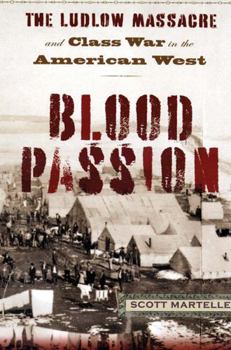Blood Passion: The Ludlow Massacre and Class War in the American West
Select Format
Select Condition 
Book Overview
By early April 1914, Colorado Governor Elias Ammons thought the violence in his state's strike-bound southern coal district had eased enough that he could begin withdrawing the Colorado National Guard, deployed six months earlier as military occupiers. But Ammons misread the signals, and on April 20, 1914, a full-scale battle erupted between the remaining militiamen and armed strikers living in a tent colony at the small railroad town of Ludlow. Eight...
Format:Hardcover
Language:English
ISBN:0813540623
ISBN13:9780813540627
Release Date:July 2007
Publisher:Rutgers University Press
Length:266 Pages
Weight:1.00 lbs.
Dimensions:0.9" x 6.3" x 9.2"
Customer Reviews
5 ratings
Forgotten history
Published by Thriftbooks.com User , 15 years ago
Too often history is written by the winners but not in this case. This should be required reading in school along with the Iron Heel by London. The money changers and robber barons of today would have you believe that they are benevolent employers when in actuality they are direct decendants of the main players in this book. If they could they would treat us just the same. Get it and read it to educate yourself of the forgotten struggle of labor in this country.
Excellent
Published by Thriftbooks.com User , 16 years ago
Excellent book on the Ludlow Massacre. Well researched and written. History buffs will really enjoy this one.
Objective and Insightful
Published by Thriftbooks.com User , 17 years ago
A wonderful walk through the events and people involved in Colorado coal mining in the early 20th century. A refreshing perspective that looks at the culmination of actions and personalities. Personally, another piece was clarified in my ancestral puzzle. My grandmother was born in the Berwind mine camp and with my immigrant Croatian greatgrandparents, resided in the Ludlow area during the books timeframe.
A look into labor relations in the western mining towns.
Published by Thriftbooks.com User , 17 years ago
There is a lot to like about BLOOD PASSION: THE LUDLOW MASSACRE AND CLASS WARFARE IN THE AMERICAN WEST by Scott Martelle. Here you will find an intricate description of life in a "company" town. It's hard to imagine today, how less than a century ago, company towns were commonplace. These were towns founded around a single business entity, in this case, coal mining, whereby the company that owned the coal mines, in essence owned the town and its' inhabitants. We study a society where it was a firing offense for an employee to purchase from anywhere other than a company owned store, where prices were set by the employer. They lived in company owned housing, in this case, tents. Their entire existence depended almost entirely on the provisions made by their employer. It's not a far stretch to say, these people existed largely as indentured servants. Martelle gives an unbiased narrative of the events that spawned the Ludlow Massacre. There is plenty of blame to go around for the massacre that occurred in 1914, and Martelle spreads that blame rather evenly between the striking workers, the strikebreakers, the owners and the National Guardsmen that became embroiled in the southern Colorado mining labor problems. Perhaps there will always remain a slight wedge between employers and employees, but hopefully never again the deep chasm that existed in the early industrialization of America. The book is a very interesting read, though at times a bit dry and slow. Martelle is not the most colorful or flamboyant of writers, but does convey his message and story with a succinct style readers will appreciate. The book will appeal to varying audiences, from those studying labor problems in America to the study of the western states. You'll find a graphic description of life a century ago in an existence hardly imaginable today.
Strikers vs. owners = no winners
Published by Thriftbooks.com User , 17 years ago
I knew nothing about the southern Colorado coal strikes and the Ludlow Massacre when I started Scott Martelle's new book, Blood Passion. By the time I finished it -- just two days after starting it -- I understood not only how, but why, the violent strike ended the way it did. Martelle's prose style is dense with facts, yet elegant and easy. The writing is beautifully done, and the story itself is so compelling that it's easy to understand why he became preoccupied with it. Each decision along the way, by owners and strikers, deepens the chasm between the two, until at last the line is not drawn but engraved in the sand and there can be no winners. Whatever your interest in the book -- through the lens of labor history, or western studies, or the social strata of the times -- you will find much here that will resonate for a long time. Martelle, who weathered the nasty Detroit newspaper strike in the mid-90s and did not cross picket lines, gives neither strikers nor owners a bye in this book. (Full disclosure: I, too, weathered that strike by honoring the picket lines.)





